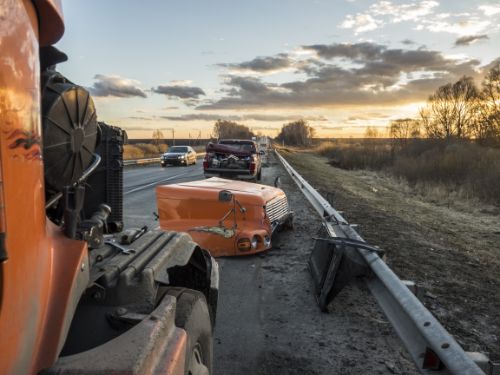Accidents involving commercial trucks can result in devastating consequences, both in terms of property damage and personal injuries. In such cases, determining liability is crucial to ensure that the responsible party compensates the victims adequately. However, there are instances when the trucking company denies liability, creating a complex situation for the victims seeking justice and compensation. This article aims to guide individuals through the steps to take if faced with a trucking company denying liability in Boise County, Idaho.
Understanding Trucking Company Liability
Trucking companies are responsible for maintaining their vehicles, training their drivers, and ensuring compliance with safety regulations. When an accident occurs involving a commercial truck, the trucking company can be held liable if negligence on their part contributed to the accident. This negligence could include factors such as improper maintenance, driver fatigue, inadequate training, or violation of federal trucking regulations.
Steps to Take If Liability is Denied
- Gather Evidence: After a truck accident, it’s crucial to collect as much evidence as possible at the scene. This includes photographs of the accident site, damage to vehicles, and any visible injuries. Eyewitness statements can also play a significant role in establishing the events leading up to the accident.
- File a Police Report: Contact local law enforcement to ensure a police report is filed. This official document can serve as valuable evidence when dealing with the trucking company’s denial of liability.
- Seek Medical Attention: Even if injuries seem minor, it’s essential to seek medical attention promptly. Some injuries might not manifest immediately and documenting your medical condition can link it to the accident.
- Consult an Attorney: Given the complexity of truck accident cases, it’s advisable to consult an experienced personal injury attorney. They can help you navigate the legal process, assess the strength of your case, and communicate with the trucking company and their insurers on your behalf.
- Preserve Evidence: Your attorney will help ensure that crucial evidence, such as electronic logging data, maintenance records, and driver logs, is preserved. This evidence can play a vital role in establishing the trucking company’s liability.
- Communicate Carefully: It’s important not to engage in direct communication with the trucking company’s representatives without your attorney’s guidance. Anything you say could be used against you or misinterpreted to weaken your claim.
Requirements in Boise County, Idaho
When dealing with a trucking company’s denial of liability in Boise County, Idaho, there are specific requirements and legal considerations to keep in mind:
- Statute of Limitations: In Idaho, there is a statute of limitations that dictates the time within which you can file a personal injury lawsuit. This period is generally two years from the date of the accident. It’s crucial to adhere to this timeline to avoid losing your right to seek compensation.
- Comparative Negligence: Idaho follows a comparative negligence rule, which means that even if you are partially responsible for the accident, you can still recover damages. However, your compensation will be reduced by the percentage of your fault.
- Evidence Preservation: The trucking company’s denial of liability makes preserving evidence even more critical. Working with an attorney ensures that important documents and records are properly secured for your case.
- Expert Witnesses: In complex truck accident cases, expert witnesses might be necessary to establish liability. These professionals can provide insights into industry standards, driver behavior, vehicle maintenance, and more.
Negotiating with the Trucking Company
After you’ve followed the initial steps and engaged an attorney, the next phase involves negotiating with the trucking company and their insurers. This can be a complex and delicate process, especially when liability is denied. Here are some key points to consider during the negotiation phase:
- Documented Communication: All communication between you, your attorney, and the trucking company should be well-documented. This includes written correspondence, emails, and any recorded phone calls. These records can be vital in case negotiations break down and legal action becomes necessary.
- Detailed Demand Letter: Your attorney will likely draft a demand letter outlining your case, the evidence you’ve gathered, the extent of your injuries, and the compensation you’re seeking. This formal document is usually sent to the trucking company’s insurance company and serves as the starting point for negotiations.
- Strength of Evidence: The evidence you’ve collected, along with expert opinions if necessary, can significantly strengthen your negotiation position. Demonstrating the strength of your case and your willingness to go to trial if needed can make the trucking company reconsider its denial of liability.
- Exploring Settlement Options: During negotiations, both parties might explore settlement options. While you and your attorney have a clear idea of what you believe your case is worth, being open to reasonable settlement offers can expedite the process and provide a quicker resolution.
- Mediation and Alternative Dispute Resolution: If negotiations stall, mediation or alternative dispute resolution (ADR) methods can be pursued. A neutral third party can facilitate discussions between you and the trucking company to find common ground.
Dealing with a trucking company’s denial of liability can be overwhelming, especially in Boise County, Idaho, where specific legal requirements apply. If you find yourself in this situation, don’t hesitate to reach out to our experienced team at Hepworth Holzer, LLP. Our dedicated personal injury attorneys understand the intricacies of truck accident cases and can guide you through every step of the process. We are committed to fighting for your rights and helping you secure the compensation you deserve. Contact us today for a consultation and let us help you navigate the path to justice.

